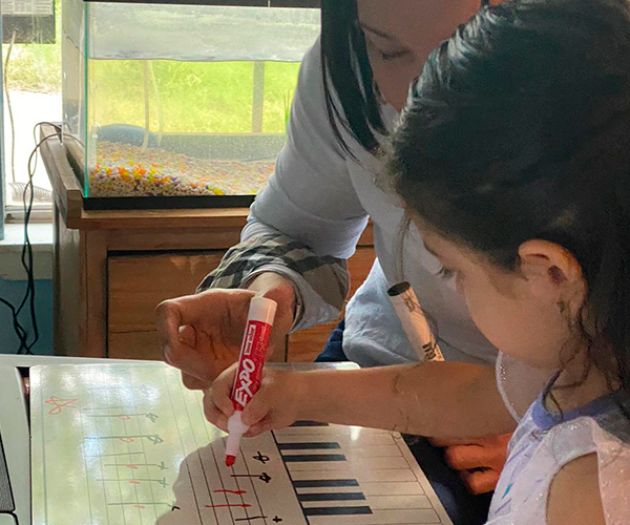
Latest in Music Education News - Cinco Ranch
The Benefits of Early Music Education for Children
Starting music education at a young age offers numerous benefits that extend beyond the ability to play an instrument. Engaging in music lessons can significantly impact a child's cognitive, emotional, and social development, enhancing their overall growth and academic performance. In this article, we'll explore the various advantages of early music education for children and how learning an instrument can positively influence their lives.
Cognitive Benefits
- Enhanced Memory and Concentration
Learning to play an instrument requires memorization of notes, rhythms, and melodies, which strengthens a child's memory skills. Regular practice also improves their ability to concentrate for extended periods, a skill that is beneficial in academic settings.
- Improved Mathematical Skills
Music education involves understanding patterns, rhythms, and scales, which are inherently mathematical concepts. This exposure helps children develop better numerical and spatial reasoning abilities, contributing to improved performance in math.
- Boosted Language Development
Music education enhances phonological awareness, the ability to recognize and manipulate sounds, which is crucial for language development. Children who learn music often exhibit better reading skills and a more extensive vocabulary.
Emotional Benefits
- Increased Self-Esteem
Mastering a musical instrument gives children a sense of accomplishment and pride in their abilities. This boost in self-esteem can translate to greater confidence in other areas of their lives, including academics and social interactions.
- Enhanced Emotional Expression
Music provides a creative outlet for children to express their emotions and feelings. Playing an instrument allows them to channel their emotions into something constructive, helping them to develop emotional intelligence and coping mechanisms.
- Stress Relief
Engaging in music can be a therapeutic activity that helps children relax and reduce stress. The act of playing an instrument or singing can serve as a healthy way to unwind and manage anxiety.
Social Benefits
- Improved Social Skills
Participating in group music lessons or ensembles teaches children how to work collaboratively with others. They learn essential social skills such as communication, cooperation, and respect for their peers, which are valuable in both academic and social environments.
- Cultural Awareness
Music education exposes children to diverse musical styles and traditions from around the world. This exposure fosters an appreciation for different cultures and promotes open-mindedness and inclusivity.
- Development of Discipline and Patience
Learning an instrument requires regular practice and perseverance. Children develop discipline and patience as they work through challenges and progress in their musical abilities, qualities that are transferable to other aspects of their lives.
Academic Performance
- Enhanced Problem-Solving Skills
Music education encourages critical thinking and problem-solving as children learn to read music, interpret notes, and correct mistakes. These skills are beneficial for academic subjects that require analytical thinking.
- Improved Time Management
Balancing music practice with schoolwork teaches children effective time management skills. They learn to prioritize tasks and manage their schedules efficiently, which is crucial for academic success.
- Higher Academic Achievement
Studies have shown that children who participate in music education tend to perform better academically. They often achieve higher grades and test scores, particularly in subjects such as math and reading.
Early music education offers a wealth of benefits that contribute to a child's cognitive, emotional, and social development. By learning an instrument, children not only acquire musical skills but also enhance their academic performance and personal growth. At In Crescendo Music Academy, we believe in the transformative power of music education and are dedicated to providing a nurturing and supportive environment for young musicians. Encourage your child to embark on this enriching journey and experience the lasting positive impact of early music education.
Summary of Benefits
- Cognitive: Enhanced memory, improved math skills, boosted language development.
- Emotional: Increased self-esteem, enhanced emotional expression, stress relief.
- Social: Improved social skills, cultural awareness, development of discipline and patience.
- Academic: Enhanced problem-solving skills, improved time management, higher academic achievement.
By recognizing and fostering these benefits, we can help children develop into well-rounded individuals with a lifelong appreciation for music.

Stay updated with the latest music education tips, teacher insights, and student success stories. In Crescendo Music Academy's blog is your resource for all things music.
Music education blog, Latest music lesson tips, Piano tutorial articles, Singing techniques blog, Acoustic guitar learning blog, Music teacher insights, Music school news updates, Beginner musician guides, Advanced music theory posts, Music performance advice, Blog on music instruments, Music student success stories, Blog for music educators, Music practice strategies, Upcoming music events blog.
LASTEST POST



